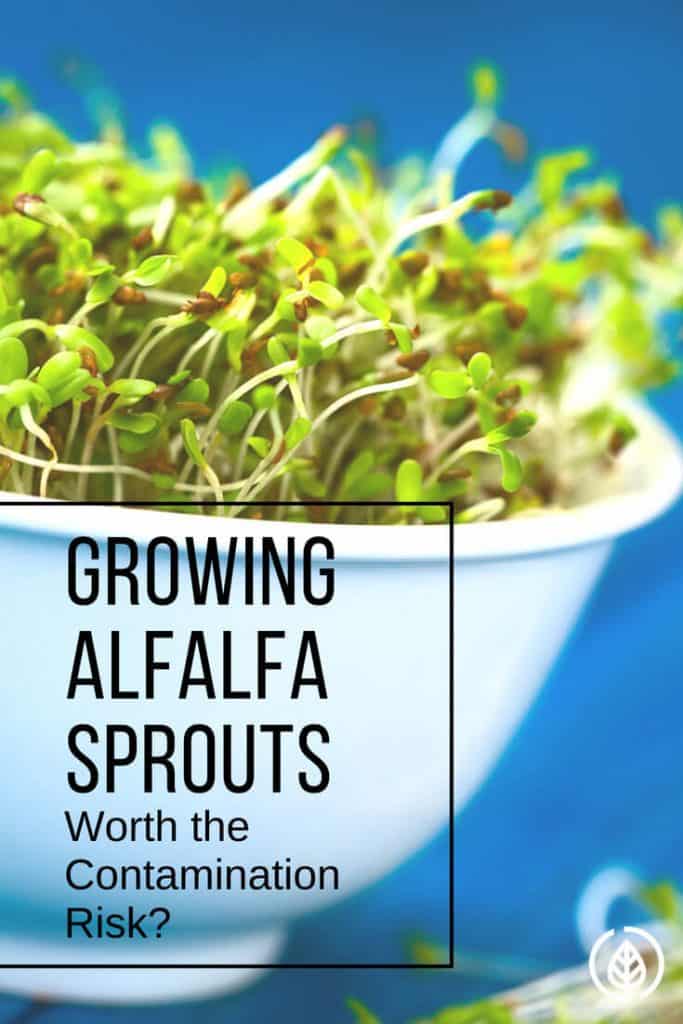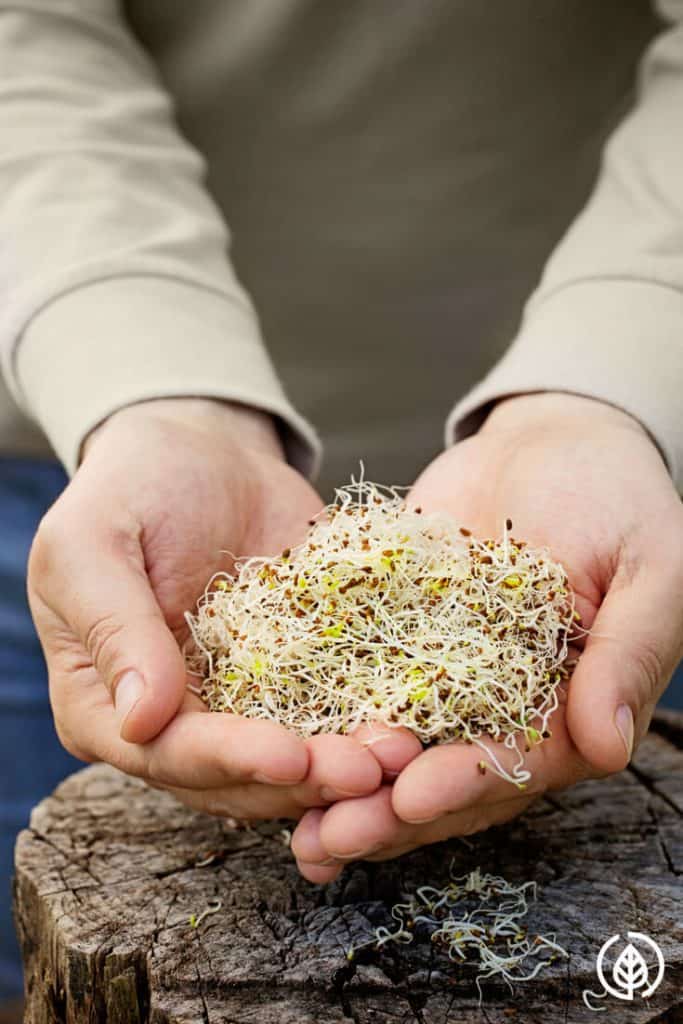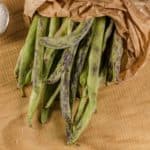Arguably considered the healthiest topping to put on a sandwich, sprouts are loaded with nutrition. But with several reports of contamination, is growing alfalfa sprouts worth the risk?

For a dose of natural health, many people are growing their own sativa these days.
No, not that sativa–cannabis sativa–you might be thinking about. But rather, Medicago sativa, otherwise known as alfalfa sprouts.
Perhaps you’re better off growing cannabis sativa rather than medicago for your health.
That’s because, as the Huffington Post food blogger, Meathead, puts it, sprouts are probably the riskiest food on the market.
Because of this risk, many may be considering growing alfalfa sprouts rather than buying them.
Contamination outbreaks, either in the form of salmonella, e. Coli or listeria, are a regular occurrence with sprouts.
In fact, Meathead’s article references a legal blog which claims that from the years 1990 to 2011, there were at least 30 outbreaks in the US alone.
These outbreaks sickened more than 2000 people. The infected people developed diarrhea, fever, and abdominal cramps. The illnesses usually last 4 to 7 days.
Most people recover without treatment, according to statistics on the FDA website.
However, regardless of how nutritious sprouts might be, diarrhea and the like isn’t worth the risk for many people.
Growing Alfalfa Sprouts At Home: Is It Safer?
When it comes to buying food, the labels “raw” and “organic” provide the consumer with confidence. The perception is raw and organic food are more nutritious and safer.
Many times, that’s true.
However, that’s not necessarily so with sprouts. That’s because they need jungle-like conditions in which to grow, i.e. humid and warm.
But these conditions are a perfect petri dish for bacteria to grow. And we’re not talking about beneficial, probiotics.
On the contrary, salmonella species, listeria and E. coli can thrive in these conditions.
It’s true that we all have a certain amount of these bacteria species living rent-free in our gut. However, it’s when we have too many of these microscopic critters in our system that can make us sick.
Which is why those more vulnerable to getting sick–young kids, pregnant women, the elderly–should probably avoid eating them.
As Meathead in his Huffpost blog eloquently puts it:
“Sprouts are made by harvesting seeds from an open field where they are easily contaminated by Bambi, Porky, Bugs, Tweetie, Mickey & Minnie, and other cute little critters who refuse to use sanitary stations to do their business.”
Even if you buy an organic brand from a small farmer, the produce can be contaminated just from growing alfalfa sprouts in the necessary conditions.
There’s dirty irrigation water, tainted from human and animal waste. And then there’s the problem with storage and transport.
Remember, to sprout the seeds, you need warmth and moisture. Add the potentially inadequate cooling of a cargo ship or 18-wheeler.
That’s a recipe not for a healthy sandwich or salad, but near-certain sickness.
Furthermore, if you grow alfalfa sprouts at home, it doesn’t necessarily make it any safer.
When Raw Isn’t Safe
Raw honey. It’s great for your health. And only raw honey–not cooked–may help prevent seasonal allergies.
Raw milk. It contains friendly bacteria (probiotics). Those who are lactose intolerant may be better able to digest it.
And despite the heavy-handed crackdowns by the federal government on independent raw milk co-ops, raw milk, is relatively safe.
But when it comes to growing alfalfa sprouts, raw might be a recipe for illness.
In light of this, should you cook the sprouts? You can, but the problem with that is they lose their crunchiness.
You can also buy some that’s been irradiated. But if you’re into natural foods, that probably doesn’t sound too appealing, does it?
Would you like some gamma rays or electron beams with your salad, mam?
No thanks!
While the FDA and other government agencies believe eating foods that have been irradiated is safe, some natural health experts think the opposite.

Alfalfa Sprouts Nutrition
Buying or growing alfalfa sprouts, then, and eating them, seems like culinary Russian roulette.
So, why, then, do people eat them?
There’s far-less riskier produce you can eat that’s just as nutritious.
What is it about the seedlings of Medicago sativa that make them a ubiquitous topping at deli counters and sandwich shops?
Well, they do have an impressive portfolio of vitamins, minerals and antioxidants.
For instance, they contain a relatively high amount of vitamin K. (But if you’re taking blood thinners or following the Coumadin diet, then don’t eat them.)
If you grow alfalfa sprouts, you are potentially consuming one of the most nutrient-dense foods on the planet.
And if you’re watching your weight, these crunchy seedlings are very low in calories and high in fiber. In addition, they even contain a decent amount of plant protein.
Normalizes Cholesterol
Of the many research studies on sprouts, much effort has been devoted to studying contamination outbreaks and solutions to limit them. Relatively fewer studies have been performed specifically on alfalfa sprouts nutrition benefits.
But there is one study that suggests it can help normalize cholesterol levels. Fifteen patients, all of whom have the condition of not being able to break down fats, were given 40 grams of alfalfa seeds three times daily at mealtimes for 8 weeks.
Nothing else about the test subjects diet was different.
After eight weeks, the results were: total blood cholesterol went down from 9.58 to 8.00; low density lipoprotein (LDL) cholesterol (the “bad” kind) went from 7.69 to 6.33.
And guess what happened after the 15 people stopped eating sprouts? Yup, their cholesterol levels shot back up to where they were before the study started.
If you have high cholesterol, that’s one argument in favor of learning how to grow alfalfa sprouts.
May Prevent Autoimmune Disease
In this research study, alfalfa seed extract increased the survival rate and life span of mice with autoimmune disease.
Minimize Risk of Cancer & Other Possible Benefits
Much of the other benefits of sprouts is corollary. In other words, there’s no study that alfalfa sprouts themselves may prevent cancer.
However, the nutrients in them have plenty of scientific backing. This includes the antioxidants that may prevent the formation of cancerous cells.
In addition, nutrients within these seedlings may help balance hormones; reduce inflammation; regulate menstrual cycles, and help ease symptoms of menopause.
Moreover, due to their low-calorie, high-fiber nature, alfalfa might help with weight management and blood sugar levels.
But, so, too, do lots of other low-starch veggies. In light of this, is it wise to grow alfalfa sprouts at home?

Where to buy alfalfa sprouts
If you’re going to, you need to purchase the seeds. Many health food stores and gardening supply stores sell them.
Of course, you can always buy them online. (The FDA has not yet banned their sale.)
Some people might think that it’s only large-scale food growers that sell potentially-contaminated seeds.
Here, again, is Meathead, to debunk this claim:
“Don’t try to pin this on Food Inc. and big ag like ConAgra or Monsanto. Most sprouts are grown by small farmers, and the sad part of this story is that, if, as I predict, groceries will stop carrying sprouts, a lot of Mom & Pop farmers will join the unemployed.”
If you’re going to buy sprouts, do so only if they are displayed in the refrigerated section. But even this does not mean the seedlings have not been contaminated when they were growing.
Cooling them just makes them dormant.
How to growing alfalfa sprouts
The easiest way to grow your own is buy placing two tbsp of seeds into the jar. Next, cover them with a few inches of cool water.
Then, take a cheesecloth. Cover the top of the jar with it, securing it with a rubber band.
Finally, soak the seeds overnight, making sure to drain off the water.
You can also grow them in soil or on a tray.
There are other, more thorough explanations of how to grow your own.
This is a great resource.
Keep in mind that one of the first reported outbreaks (in 1973) was associated with sprouts grown by using a home sprouting kit.
According to the Journal of Food Protection raw sprouts have been implicated in a number of foodborne disease outbreaks.
“Because contaminated seeds are usually responsible, many sprout producers attempt to disinfect seeds before germination and detect sprout contamination during production,” says the research.
The research goes on to say that most implicated sprouts were from seeds that underwent heat treatment and soaking with a 2,000-ppm sodium hypochlorite solution. To avoid contamination, the FDA recommends a 20,000-ppm calcium hypochlorite soak.
With this in mind, if you’re buying it from the store, you can contact the grower and ask them how they soak the sprouts.
This research in Food Science & Nutrition suggests thymol and resveratrol at 0-500 ppm inhibit growth and survival of E. coli and Staphylococcus aureus.
However, this begs the question again: is it worth it? Especially when you can consume other nutrient dense foods that are less risky.
In comparison with other fresh produce, sprouts pose a special risk. The sprouting process is a “potent bacterial amplification step that occurs shortly before marketing and consumption.”
Do you grow alfalfa sprouts? Any tips to keep it safe?





